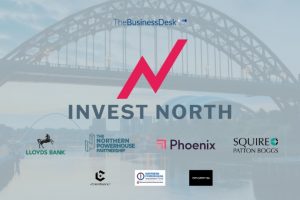Innovation accelerators and increased lab space key to North’s health and life sciences sectors


It was led by TheBusinessDesk.com and supported by Lloyds Bank, Northern Powerhouse Partnership, Phoenix Group, and Squire Patton Boggs.
From the outset the intention was to focus on Northern leaders and voices who knew the opportunities and challenges from unlocking investment best of all, and around 150 organisations contributed to the discussions which helped shape the report’s recommendations.
The Invest North report sets out 12 policy recommendations, which focus on four prime capabilities of sectors that will drive prosperity – energy and net zero, manufacturing and materials, digital and culture, and health innovation – alongside cross-cutting proposals.
Like elsewhere in Britain, the North’s health and life sciences sectors benefit from NHS, industry and academia working together to provide a base for developing new research and the potential for commercialisation.
Elected officials are now playing a more significant role thanks to devolution which has granted Greater Manchester influence over its health and social care budget, with further devolution plans for Mayors across Yorkshire. Convening powers give the combined authorities particular opportunities to effect change.
What makes Health Innovation another Prime Capability for the North lies in its strengths in health and life sciences highlighted by the NPIER as medical technologies and devices, plus growing competence in new and efficient service delivery models brought about by e-health developments.
Across the North, the seven Integrated Care Systems are leveraging connections in the context of the relationship between health and the economy. The ecosystem is supported by renowned academic institutions such as the NHSA, the National Centre for Ageing in Newcastle, the Centre for Public Health at the University of Liverpool, the Healthy Lifespan Institute in Sheffield, and N8 Universities.
Confidence across the North
Invest North’s contributors made the importance of collaboration clear and discussed how established comparative advantages are giving the North the lead today. Frank Miller, CEO of CPI which is a member of the High Value Manufacturing Catapult, hosted our roundtable at its new world-class life science office and laboratories in Darlington: “we are looking at biomanufacturing where Tees Valley’s got a long history back to the 1950s. There are genuinely unique skills and understanding of biomanufacturing in this region, and we are able to deploy those into growing spaces like the future of food, agritech, biopharmaceuticals. They are genuinely long-term global opportunities for Tees Valley.”
Collaboration across regions was clearly a strength. Former chair of Leeds City Region Enterprise Partnership, Mark Roberts, described how “in the innovation arc in Leeds we’ve got this amazing collection of universities, NHS Trusts and great businesses getting together to do some amazing things”.
These wider benefits are also being felt beyond Leeds with connections to Huddersfield and Bradford that would benefit from additional investment: “we almost talk about creating our own little golden triangle outside of the South. That’s a real opportunity for us if we put in the investment behind it.”

Steve Rotheram at the Invest North round table in Liverpool
The coming together of unique assets means that global companies can make investments with confidence. Posing the question about how Leeds has attracted global life science investments, Sir Roger Marsh was clear that the North’s capacity to look to the future makes the difference “because [companies] are thinking about clinical trials that are not just in person anymore, but in patient. So when people ask me what do I mean about life sciences in the Leeds city region, I talk about three the three Ds, data, devices and diagnostics.”
Participants were ambitious sharing investable opportunities that can drive the health and life sciences opportunity in the North. In Liverpool, Professor Janet Hemingway of the Liverpool School of Tropical Medicine threw down the gauntlet: “nobody’s thinking small. We are globally leaders in infection control R&D. We do that in digital. We do that in the lab side. I think there is the opportunity to take that next big step and have something that is sitting around an infection R&D Super Cluster that has a nucleus, sitting here, but actually brings in a lot of the North West”.
Mayor Steve Rotheram took up the challenge of advances in health technology offering the potential for algorithms and artificial intelligence to assist diagnosis and treatment and how Merseyside could play its role in accelerating progress with the right approach “that could happen as part of a real strategic health innovation in the city region: all of the different bits could come together.” He continued to explain how the gains from regional collaboration supported by devolved governance would be a benefit again to Whitehall: “Government would be interested in that because it takes pressure off the NHS at the moment, using data in a different way so that we can predict some of these things and prevent it, and that will take the pressure off the NHS.”
Unlocking Investable Propositions beyond seed funding

Neil Murray
Better leveraging Northern assets requires long-term commitments guaranteed by Metro Mayors’ respective place-based industrial strategies plus connected health infrastructure government already promised by national government, to give industry and investors the confidence to move on from allocating seed funding to taking significant long-term investment.
Therefore, we recommend the enhancement of the commercial potential of the North of England’s investable life science propositions by drawing on further innovation accelerators underpinned by co-ordination across the North.
The business demand is there as explained by Neil Murray, chief executive of Impact Data Metrics, who also heads a biotech and infectious disease company and stressed the importance of growth funding: “getting seed capital is easy. It’s the next stage that enables companies to grow and prosper and develop into businesses that will employ hundreds of people, not the two or three or four or 10. And that’s the real challenge that we have.”
Increasing laboratory space and facilities
Contributors discussed the potential to maximise mixed developments with strong health focus from Alderley Park in the North West to the Helix in Newcastle upon Tyne, alongside new opportunities such as that created by the assets in Liverpool’s health cluster and those released by the New Hospitals Programme in Leeds.

Prof Janet Hemingway
Health innovators are looking at how to enhance facilities through AI and robotics and the importance of institutional investors and government commitment. Prof Hemingway said: “it needs a lot of the people around this room to sit down and say let’s turn this into that big investable proposition. Let’s make sure that we’ve got the commercial proposition because we’ve got the industry behind it, because we’ve got the the academic base behind it, because we’ve got the NHS behind it.”
We therefore recommend the increase in supply of lab space and facilities across the North, focusing innovation zones on these areas where possible, specifically to attract further Foreign Direct Investment and allow fast growing businesses spinning out of our universities to expand.










